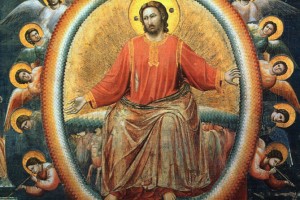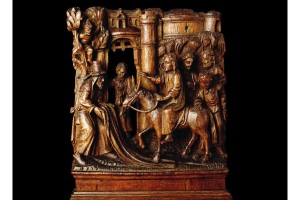When I was kid, I learned all about Jesus’ miracles from boards covered in flannel. An old Egyptian woman named Anna would use tiny—also flannel—cutouts of biblical characters to painstakingly illustrate the story of Jesus raising Lazarus, walking on water, or feeding the five thousand. This was great because watching Anna stick the fuzzy characters to blue board taught me the basic stories of my faith. The unfortunate side effect was that after a while, Jesus became a glorified magician.
It is hard to appreciate Jesus the magician when Criss Angel also walks on water. And I think we can all agree that Jesus and Criss are vastly different individuals. Aside from the clash of Jesus’ flannel with Criss Angel’s leather and chains, I don’t find myself thinking about the purpose of the latter’s magic tricks; I just question how he does them. I re-watch the same two seconds on YouTube over and over again to look for the glare of glass pedestals in the water.
It would be sad if my understanding of Jesus’ miracles were reduced to that. Sadly, this has been the case of popular culture. More time is spent on whether Jesus actually did anything truly miraculous than on what he was communicating if he did. And this shift in emphasis has brought on an irritating side effect: a proliferation of remarks and TV specials regarding those who also performed miracles in Jesus’ day, which to begin with is a bit of a misleading category.
Parallels are found from the Egyptian Horus to the Arabian Muhammad. And nearly every anti-Christian television or radio personality has made a point of publicizing it. The most popular first century superstar promoted as a rival to Jesus is Apollonius of Tyana. For those of you who have never heard of him, let me try to make a comparison with someone alive today. And I have to be honest, I’m stealing this comparison from Dr. Clint Arnold of Talbot School of Theology. Apollonius is the first century version of Dos Equis’ “most interesting man in the world.” Apollonius knows every language, doesn’t fear death, is the personal advisor to multiple Roman emperors, and never did an evil thing his entire life. Along with these killer credentials, Apollonius performs many miracles that look conspicuously similar to some that Jesus performed. These include the exorcism of demons, multiple healings, and even raising someone from the dead. No one who knew about Jesus and Apollonius could fail to make the connection.
For centuries, people argued about who was greater. Beginning with Eusebius all the way to the modern Religionsgeschichtliche Schule (School of Religious History), Apollonius was put in the boxing ring with Jesus. Believers and unbelievers alike argued about who was greater. And for so long, people missed the point. They argued about degree of abilities and historical authenticity. As the arguments continued, they moved further away from fruitful ground.
The scholarly community has slowly pushed our eyes away from what Jesus teaches through his miracles and towards whether or not they actually happened. Through sleight of hand and subtle misdirection, the scholarly world – including many Christians – has transformed the typical Christian bookstore into an apologetics library. I don’t want to deride apologetics, but I do want to show that it may be a little over-emphasized (cf. John’s post on the goal of apologetics and the centrality of the Resurrection).
For a second, let’s pretend like we aren’t closet naturalists and assume that both Jesus and Apollonius performed every miracle attributed to them. Both of these figures bring life back to a dead person. While in Rome, Apollonius revives a dead bride on her wedding day:
Apollonius performed another miracle. There was a girl who appeared to have died just at the time of her wedding. The betrothed followed the bier, with all the lamentations of an unconsummated marriage, and Rome mourned with him, since the girl belonged to a consular family. Meeting with this scene of sorrow, Apollonius said, “Put the bier down, for I will end your crying over the girl.” At the same time he asked her name, which made most people think he was going to declaim a speech of the kind delivered at funerals to raise lamentation. But Apollonius, after merely touching her and saying something secretly, woke the bride from her apparent death. The girl spoke, and went back to her father’s house like Alcestis revived Heracles (Vita Apollonii 4.45).
Many Bible readers and those who just sat through flannel board presentations will recognize the similarities between this story and the raising of Jairus’ daughter in Mark 5, Matthew 9 and Luke 8. Some have noted this similarity, saying that Jesus and Apollonius both touch, address, and revive the deceased. The purpose of Apollonius’ miracle is unclear. It could be about proper custom observance because it calls to the readers mind the Aclestis-myth or it could be about Apollonius’ superior knowledge: a theme that runs throughout many of the stories about him. Either way, it is used to heighten the importance and prominence of the main character.
With Jesus, it’s different. The family of the dead girl does not expect Jesus to raise her from the dead, because in their eyes, death is irreversible. But Jesus disagrees and tells the family, “Do not fear, only believe.” In the moment of the miracle, Jesus draws everyone’s attention to the type of faith that matters. Few people put it as well as Darrell Bock:
The faith called for here is confidence about God’s power, compassion, and capability to deliver the child out of death. It is such reliance that is commendable before God. Letting Jesus proceed will show that such faith is present.[1]
Apollonius is the sage that you might be lucky to run into in your time of need. Jesus is the Son of God who cares about his people and can deliver them regardless of how dire their situation is. So this young bride is revived by Apollonius, but to what life? Not one with a personal God invested in His people.
I think this is where fruitful conversation lies. I can sit around all day wondering if Criss Angel really walked on water. If that is all I did with Jesus, I would be missing out.
[1] Darrell Bock, Luke (Grand Rapids, Michigan: BakerBooks, 1994), 800.





6 Comments
Leave your reply.